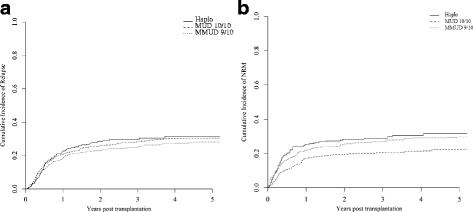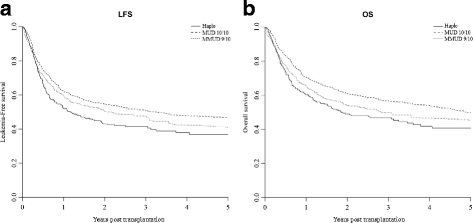A comparison between allogeneic stem cell transplantation from unmanipulated haploidentical and unrelated donors in acute leukemia
- PMID: 28103944
- PMCID: PMC5248464
- DOI: 10.1186/s13045-017-0394-2
A comparison between allogeneic stem cell transplantation from unmanipulated haploidentical and unrelated donors in acute leukemia
Abstract
Background: In the absence of a HLA-matched related or matched unrelated donor, allogeneic stem cell transplantation (allo-SCT) from mismatched unrelated donors or haploidentical donors are potential alternatives for patients with acute leukemia with an indication to allo-SCT. The objective of this study was to compare the outcome of allo-SCT from T cell-replete haploidentical (Haplo) versus matched (MUD 10/10) or mismatched unrelated donor at a single HLA-locus (MMUD 9/10) for patients with acute leukemia in remission.
Methods: Two hundred sixty-five adult patients with de novo acute leukemia in first or second remission that received a Haplo-SCT between January 2007 and December 2013 were compared with 2490 patients receiving a MUD 10/10 and 813 receiving a MMUD 9/10. Propensity score weighted analysis was conducted in order to control for disease risk imbalances between the groups.
Results: The weighted 3-year non-relapse mortality and relapse incidence were 29 and 30% for Haplo, 21 and 29% for MUD 10/10, and 29 and 25% for MMUD 9/10, respectively. The weighted 3-year leukemia-free survival (LFS) and overall survival (OS) were 41 and 46% for Haplo, 50 and 56% for MUD 10/10, and 46 and 48% for MMUD 9/10, respectively. Using weighted Cox model, both LFS and OS were significantly higher in transplants from MUD 10/10 compared from those in Haplo but not different between transplants from MMUD 9/10 and Haplo. The type of donor was not significantly associated with neither acute nor chronic graft-versus-host disease.
Conclusions: Patients with acute leukemia in remission have better outcomes if transplanted from a MUD 10/10. We did not find any significant difference in outcome between transplants from MMUD 9/10 and Haplo, suggesting that both can be equally used in the absence of a 10/10 MUD. KEY POINT 1: Better outcomes using fully (10/10) matched unrelated donor for allo-SCT in acute leukemia in remission. KEY POINT 2: Similar outcomes after allo-SCT from unmanipulated haploidentical graft or mismatched (9/10) unrelated donor in acute leukemia in remission.
Figures


References
-
- O’Reilly RJ, Kernan NA, Cunningham I, et al. Allogeneic transplants depleted of T cells by soybean lectin agglutination and E-rosette depletion. Bone Marrow Transplant. 1988;3:3–6.
-
- Aversa F, Tabilio A, Terenzi A, et al. Successful engraftment of T cell depleted haploidentical three loci incompatible transplants in leukemia patients by addition of recombinant human granulocyte colony stimulating factor mobilized peripheral blood progenitor cells to bone marrow inoculum. Blood. 1994;84:3948–3955. - PubMed
-
- Lee KH, Lee JH, Kim DY, et al. Hematopoietic cell transplantation from an HLA-mismatched familial donor is feasible without ex-vivo T-cell depletion after reduced-intensity conditioning with busulfan, fludarabine and antithymocyte globulin. Biol Blood Marrow Transplant. 2009;15:61–72. doi: 10.1016/j.bbmt.2008.10.025. - DOI - PubMed
-
- Lu DP, Dong L, Wu T, et al. Conditioning including antithymocyte globulin followed by unmanipulated HLA-mismatched/haploidentical blood and marrow transplantation can achieve comparable outcomes with HLA-identical sibling transplantation. Blood. 2006;107:3065–3073. doi: 10.1182/blood-2005-05-2146. - DOI - PubMed
Publication types
MeSH terms
Substances
LinkOut - more resources
Full Text Sources
Other Literature Sources
Medical
Research Materials

